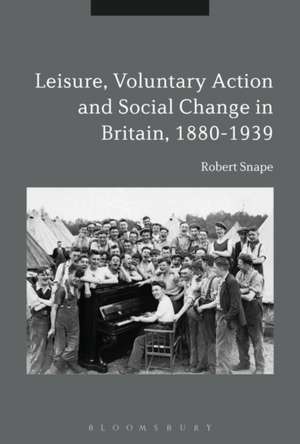Leisure, Voluntary Action and Social Change in Britain, 1880-1939
Autor Robert Snapeen Limba Engleză Hardback – 4 apr 2018
| Toate formatele și edițiile | Preț | Express |
|---|---|---|
| Paperback (1) | 174.35 lei 3-5 săpt. | +21.38 lei 6-12 zile |
| Bloomsbury Publishing – 30 oct 2019 | 174.35 lei 3-5 săpt. | +21.38 lei 6-12 zile |
| Hardback (1) | 715.34 lei 6-8 săpt. | |
| Bloomsbury Publishing – 4 apr 2018 | 715.34 lei 6-8 săpt. |
Preț: 715.34 lei
Preț vechi: 1028.14 lei
-30% Nou
Puncte Express: 1073
Preț estimativ în valută:
136.92€ • 142.40$ • 114.74£
136.92€ • 142.40$ • 114.74£
Carte tipărită la comandă
Livrare economică 14-28 martie
Preluare comenzi: 021 569.72.76
Specificații
ISBN-13: 9781350003019
ISBN-10: 1350003018
Pagini: 256
Ilustrații: 10 bw illus
Dimensiuni: 156 x 234 x 26 mm
Greutate: 0.52 kg
Editura: Bloomsbury Publishing
Colecția Bloomsbury Academic
Locul publicării:London, United Kingdom
ISBN-10: 1350003018
Pagini: 256
Ilustrații: 10 bw illus
Dimensiuni: 156 x 234 x 26 mm
Greutate: 0.52 kg
Editura: Bloomsbury Publishing
Colecția Bloomsbury Academic
Locul publicării:London, United Kingdom
Caracteristici
Includes a case-study of John Brown Paton, prominent Congregationalist and social reformer who founded several leisure and educational groups
Notă biografică
Robert Snape is Head of the Centre for Worktown Studies and Reader in Leisure and Sport at the University of Bolton, UK.
Cuprins
Introduction 1.1 Historicizing Leisure, Voluntary Action and Social Change1.2 Leisure and Community1.3 Leisure, Voluntary Action and Civil Society1.4 Overview of Content2. Associational Leisure and the Formation of Community in the Mid- Nineteenth Century2.1 Introduction2.2 Industrialization, Urbanization and Community2.3 Leisure in Mutual Association 2.4 Temperance, Leisure and Community2.5 Working-Men's Clubs 2.6 Conclusion3. Evangelicalism and the Inner Mission: Religion, Leisure and Social Service3.1 Religion, the Social Mission and Leisure3.2 Towards Social Service: John Brown Paton, Leisure and the Inner Mission 3.3 Conclusion4. Leisure, Community and the Settlement Movement4.1 Introduction4.2 The Barnetts and Toynbee Hall4.3 Oxford House and the Public School Mission4.4 The Liverpool University Settlement4.5 The Settlement Movement, Social Work and Leisure5. Utopian and Radical Leisure Communities5.1 Introduction5.2 The Clarion Movement5.3. The Co-operative Movement6. Leisure in Inter-War Britain7. Theorizations of Leisure and Voluntarism in post -First World War Social Reconstruction7.1 Introduction7.2 Leisure in the New Society7.3 New Leisure Makes New Men7.4 Leisure, Modernity and Social Change7.5 Conclusion8. Social Service, Reconstruction and Leisure8.1 Introduction8.2 The National Council of Social Service - Leisure and Community Well-Being8.3 Re-constructing the Rural Community: Leisure, Village Halls and Folk Dance8.4 The New Estates and Community Centres9. Young People, Youth Organizations and Leisure9.1 Introduction9.2 Leisure, Young People and Industrial Welfare in the First World War9.3 Educating the Young Citizen9.4 Cultural Rebels and Radical Leisure Association10. Leisure, Unemployment and Social Service10.1 Introduction10.2 Unemployment, Leisure and Social Capital 11. Work-Based Leisure Communities11.1 Work, Leisure and Community in Inter-War Britain11.2 The Workplace as a Social Community11.3 Model Industrial Villages and Leisure11.4 Leisure and Industrial Welfare in Inter-war Britain11.5 Co-operative and Collective Alternatives to Welfare11.6 ConclusionConclusionsSelect BibliographyIndex
Recenzii
[A] broad-ranging book covering sixty busy and important years in modern British history. The clear chapter titles mean that they could very easily be set as enjoyable reading for undergraduate and postgraduate students to good effect, due to its valuable combination of interesting stories and sophisticated conceptualization.
[The book's] great value lies in stressing the relationship between politics, pleasure, and people ... An effective, stimulating volume that will serve to prompt (it is to be hoped) a reconsideration of leisure and voluntary action as political forums in early twentieth-century Britain. And, indeed, in early twenty-first-century Britain.
A fascinating account of how a wide range of different groups and individuals saw and promoted leisure as a means of reforming society for better. This is a book full of fascinating details and is based upon a vast array of research.
Robert Snape offers a new and compelling perspective on voluntary action and social services by placing associational leisure at the center of its narrative. This analysis of work and youth leisure provide valuable insights into social welfare in 20th century Britain.
[The book's] great value lies in stressing the relationship between politics, pleasure, and people ... An effective, stimulating volume that will serve to prompt (it is to be hoped) a reconsideration of leisure and voluntary action as political forums in early twentieth-century Britain. And, indeed, in early twenty-first-century Britain.
A fascinating account of how a wide range of different groups and individuals saw and promoted leisure as a means of reforming society for better. This is a book full of fascinating details and is based upon a vast array of research.
Robert Snape offers a new and compelling perspective on voluntary action and social services by placing associational leisure at the center of its narrative. This analysis of work and youth leisure provide valuable insights into social welfare in 20th century Britain.
